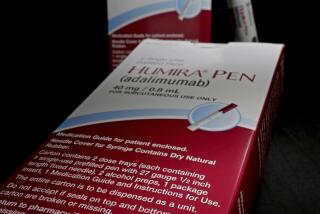Syncor Fails to Impress Its Investors
- Share via
It’s hard to tell whether Syncor International, the nation’s biggest chain of radioactive drug pharmacies, has been successfully nursed back to health or needs a good dose of fiscal medicine.
Last week, the Chatsworth company disclosed earnings for the third quarter ended Feb. 29 that show a substantial improvement over a year ago. Syncor posted a profit of $368,000 contrasted with a loss of $1.3 million a year earlier, as sales rose 9% to $26.1 million.
Investors Still Unimpressed
But while Syncor went from red ink to black, investors and analysts familiar with the company are unimpressed. They say the company’s profits continue to lag behind what they should be and blame management for failing to control costs.
“The company is very unexciting. You just don’t get the sense anyone there is taking a good, hard look at how to get these costs down. Year after year they just don’t do it,” said Larry Selwitz, an analyst with Bateman Eichler, Hill Richards in Los Angeles.
Syncor owns some 80 nuclear pharmacies nationwide. Although called pharmacies, they are not at all like the glass-enclosed pharmacy in back of a Thrifty Drug.
Syncor’s pharmacies are free-standing operations but aren’t open to the public. Syncor employees mix radiopharmaceuticals, which are chalky radioactive materials that patients swallow or have injected in them so doctors, using special medical equipment, can better scan the patient’s internal organs. Syncor Chairman Monty Fu estimates Syncor controls 45% of the $220 million-a-year radiopharmaceuticals business.
Syncor’s after-tax profit margin, a key measure of financial strength, was a modest 3.2% for the nine months ended Feb. 29. In its last fiscal year ended May 31, 1987, the company earned $2.3 million on sales of $98.3 million for a profit margin of 2.3%.
“There has been slight improvement, but it’s not yet where we would like to get it,” said Charles F. Panneciere, an executive with Compagnie Oris Industrie, a French group that is Syncor’s largest shareholder with nearly 15% of the stock.
Profit Margin Too Low
Analysts and investors contend that profit margins for a company like Syncor should be at least 5% and probably should be closer to 8%. The company has not come close to achieving that in more than five years.
The company’s stock has also lagged, closing at $4.75 Monday, compared to nearly $7 a share one year ago.
Fu blames the low margins on two things: competition that keeps down the prices Syncor can charge for its services and high salary costs for its pharmacists. He said that pharmacists, because they are in demand, often command salaries of more than $40,000 a year when they are hired out of school.
Fu concedes, however, that other factors are keeping costs up, such as the company’s failed attempts to sublease an empty, 30,000-square-foot building it has in Albuquerque, N.M.
He remains confident, however, that Syncor is getting back in shape. He said Syncor recently renegotiated some lower prices from suppliers. And it is increasing its business of supplying non-radioactive therapeutic drugs that are administered to patients in their homes. The company has also signed an exclusive agreement to distribute nuclear medicine products made by Du Pont that are used to diagnose cancer, heat disease and other illnesses.
He also notes that the company has repurchased some 700,000 shares of stock since last October’s stock market crash.
But Syncor still faces two other problems. Last December, a subsidiary of Hoffmann-La Roche bought 10 nuclear pharmacies from Summa Medical, a New Mexico company that formerly was a Syncor competitor.
This makes the giant drug company a major Syncor rival. It also resulted in Hoffmann-La Roche cutting off exclusive drugs it previously supplied to Syncor.
Fu estimates that the exclusive drugs supplied by Hoffman La-Roche make up only about 3% of Syncor’s sales. He believes the company can make up the lost business from other suppliers.
Faces Antitrust Lawsuit
Syncor also faces an antitrust suit filed last year in U.S. District Court in New Mexico by Summa. The company claims Syncor tried to prevent Summa from gaining a better foothold in the business, and even accuses Syncor employees of trashing a Summa office in Anaheim.
Syncor has denied the accusations. Fu said he is not worried about the suit, saying that other courts have ruled in favor of Syncor in its battles with Summa.
Fu insists the company is building high-tech pharmacies of the future. Exclusive agreements like the one with Du Pont will help it get there, Fu says, as will the development and use on patients of such things as “magic bullets,” a term to describe monoclonal antibodies that seek out diseased cells in the body.
More to Read
Inside the business of entertainment
The Wide Shot brings you news, analysis and insights on everything from streaming wars to production — and what it all means for the future.
You may occasionally receive promotional content from the Los Angeles Times.







